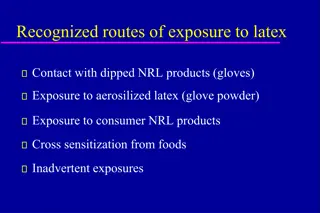Exploring the Varieties of Disposable Gloves
Disposable gloves are crucial protective equipment across various industries, including healthcare, food service, automotive, and laboratories. Understanding the different types of gloves available allows professionals to make informed choices tailor
Download Presentation

Please find below an Image/Link to download the presentation.
The content on the website is provided AS IS for your information and personal use only. It may not be sold, licensed, or shared on other websites without obtaining consent from the author.If you encounter any issues during the download, it is possible that the publisher has removed the file from their server.
You are allowed to download the files provided on this website for personal or commercial use, subject to the condition that they are used lawfully. All files are the property of their respective owners.
The content on the website is provided AS IS for your information and personal use only. It may not be sold, licensed, or shared on other websites without obtaining consent from the author.
E N D
Presentation Transcript
WHAT ARE THE DIFFERENT TYPES OF DISPOSABLE GLOVES? Get Started www.sentinel-laboratories.com
Introduction Disposable gloves have become an essential protective equipment industries, from healthcare and food service to automotive and laboratory work. Understanding the various types available helps professionals make informed decisions about which gloves best suit their specific comprehensive guide explores the different categories of disposable gloves, their unique properties, and ideal applications. across numerous needs. This
Nitrile Gloves: The Versatile Champion Nitrile gloves stand out as one of the most popular disposable glove distributors today. Made from synthetic rubber, these gloves offer exceptional chemical resistance and durability. Nitrile gloves are perfect for those with latex allergies, offering superior puncture resistance and sensitivity for handling instruments. They also resist oils and chemicals, ideal for healthcare and industrial use. choices among
Latex Gloves: Natural Protection Traditional latex gloves are favored in medical settings for their elasticity, comfort, dexterity, and tactile sensitivity, making them ideal for fine motor skill procedures. However, they have limitations, including potential allergic reactions and lower chemical resistance compared to synthetic gloves. Despite these issues, many healthcare facilities still use latex gloves for non-high-risk procedures where comfort and sensitivity are essential.
Vinyl Gloves: Cost-Effective Basic Protection Vinyl gloves are a cost-effective choice for basic hand protection, made from polyvinyl chloride (PVC) and suitable for low-risk tasks. Commonly used in food service for tasks requiring frequent glove changes, they are easy to put on and take off due to their loose fit. However, vinyl gloves are less durable and chemically resistant compared to nitrile or latex gloves, and their reduced tactile sensitivity and puncture resistance make them less suitable for demanding applications.
Specialized Glove Materials for Unique Applications Several specialized materials beyond the three primary types serve specific industry needs: Polyethylene gloves: Basic protection for food handling and light tasks; cost-effective and suitable for frequent changes. Neoprene gloves: Excellent chemical resistance, ideal for laboratory work with harsh substances, offering durability. Chloroprene gloves: Combine latex comfort with synthetic chemical resistance, providing sensitivity and protection.
Choosing the Right Glove for Your Needs Selecting disposable gloves involves considering factors like work environment, chemical exposure, dexterity needs, and budget. For healthcare, nitrile gloves offer protection and comfort; for food service, vinyl gloves are cost-effective; and for industrial use, neoprene or specialized materials provide chemical resistance. Glove thickness is important as thicker gloves enhance protection but may reduce dexterity, while thinner gloves improve sensitivity but offer less barrier protection.
Quality Standards and Supplier Selection Partnering with reputable suppliers like Kimberly-Clark for disposable gloves ensures consistent quality and reliable supply chains. Established manufacturers follow strict quality control and offer various products. Certifications, such as FDA approval for medical use or food-grade certifications, guarantee compliance with industry standards. Future Trends in Disposable Glove Technology The disposable glove industry is advancing with biodegradable options, improved manufacturing for comfort and durability, and smart gloves with sensors for temperature and chemical detection. Professionals can choose glove types that balance cost, resistance, and sensitivity, enhancing safety and productivity across industries.
Closing Thoughts Choosing the incorrect gloves can lead to safety risks and costly compliance issues. Sentinel Laboratories conducts thorough testing to determine which glove materials perform effectively conditions, assessing puncture resistance, chemical compatibility, and durability across various industries. Partner with Sentinel Laboratories to access data-driven transform glove guesswork into strategic making, ensuring maximum protection while optimizing operational costs. insights selection that from in real-world decision-
CONTACT US! +44 1444 484044 www.sentinel-laboratories.com sales@sentinel-laboratories.com
Thank You! For Your Attention www.sentinel-laboratories.com























